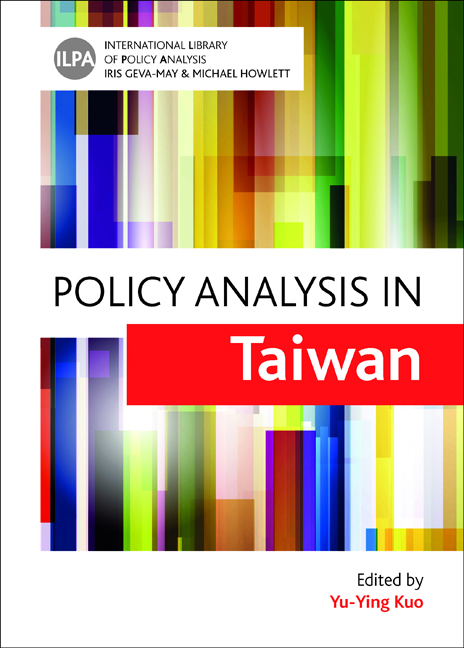Book contents
- Frontmatter
- Contents
- List of tables and figures
- Acknowledgements
- Notes on contributors
- One Policy analysis in a time of turbulence
- Two Exploring policy advisory committees in the central government
- Three Analysis of innovative local government policies in Taiwan
- Four Policy analysis in the legislative body: the legislative process of the Soil and Groundwater Pollution Remediation Act in Taiwan
- Five Policy analysis in the local councils
- Six Gendering policy analysis? The problems and pitfalls of participatory ‘gender impact assessment’
- Seven The power of influencing policies, or getting their share and more: interest groups in Taiwan
- Eight Think tanks in Taiwan
- Nine The development of public engagement in Taiwan
- Ten Social media and policy evolution in Taiwan
- Eleven Policy analysis by non-governmental organisations in Taiwan
- Twelve Policy network of universal healthcare reform in Taiwan
- Thirteen Public policy and administration research
- Fourteen Too critical to ignore? A tri-dimensional relationship examination of policy analysis internship in Taiwan
- Fifteen Policy analysis in Taiwan in an international perspective
- Sixteen Policy analysis education in Taiwan: a comparative perspective
- Index
One - Policy analysis in a time of turbulence
Published online by Cambridge University Press: 11 March 2022
- Frontmatter
- Contents
- List of tables and figures
- Acknowledgements
- Notes on contributors
- One Policy analysis in a time of turbulence
- Two Exploring policy advisory committees in the central government
- Three Analysis of innovative local government policies in Taiwan
- Four Policy analysis in the legislative body: the legislative process of the Soil and Groundwater Pollution Remediation Act in Taiwan
- Five Policy analysis in the local councils
- Six Gendering policy analysis? The problems and pitfalls of participatory ‘gender impact assessment’
- Seven The power of influencing policies, or getting their share and more: interest groups in Taiwan
- Eight Think tanks in Taiwan
- Nine The development of public engagement in Taiwan
- Ten Social media and policy evolution in Taiwan
- Eleven Policy analysis by non-governmental organisations in Taiwan
- Twelve Policy network of universal healthcare reform in Taiwan
- Thirteen Public policy and administration research
- Fourteen Too critical to ignore? A tri-dimensional relationship examination of policy analysis internship in Taiwan
- Fifteen Policy analysis in Taiwan in an international perspective
- Sixteen Policy analysis education in Taiwan: a comparative perspective
- Index
Summary
Introduction
A quarter-century after peaceful democratic reforms and liberal economic development in the country, Taiwan is now entering an era of turbulence. To an extent, the challenges facing Taiwan today are part of a young democracy's growing pains. Recent political uncertainty and financial difficulty in Taiwan have raised legitimate concerns about the Taiwanese government's ability to form workable policies that benefit the people. This chapter examines and explains the current governance crisis affecting Taiwan on several fronts. Increasing financial austerity, incessant partisan disputes, greater electoral polarisation, and the growing clout of the news media have made the entire public policy-making process – from problem identification to policy evaluation – much more uncertain and unpredictable. Whereas the past authoritarian regime was able to impose policies without much opposition, today's democratically elected government must learn to make policies in a politically and financially unstable environment, in the face of a raucous, fickle, and sometimes unforgiving public. The chapter ends with an analysis of the implications of the current turbulent era on the state of policy analysis in Taiwan.
After its retreat from Mainland China to Taiwan in 1949, the Nationalist Party (Kuomintang or KMT) controlled almost every aspect of the country, and Taiwan came under a single-party authoritarian regime. There was an ongoing fight against this authoritarianism, but it was not until 1986 that the opposition was strong enough to form a political party, the Democratic Progressive Party (DPP), and mobilise a nationwide challenge to the KMT. In 1987, one year after the DPP's birth, President Chiang Ching-kuo lifted martial law, and the process of democratic transformation in Taiwan officially started.
During the democratic transition period, corruption issues were more visible and salient in election campaigns than any other political issue (Fell, 2002). In fact, the DPP's anti-corruption campaigns of the 1990s were a critical factor in terminating the KMT's over 50-year single-party authoritarian regime. In May 2000, when the KMT peacefully turned over the presidency to the DPP, Taiwan was considered as a model among third-wave democracies (Yu et al, 2008). As Rigger (2004: 285) argued: ‘Taiwan's transformation from single-party authoritarianism to multiparty democracy came about with very little violence or bloodshed. Nor did it require wrenching economic or social upheavals. In fact, one might describe Taiwan’s experience as “best-case” democratization.’ How well does policy analysis evolve during democratisation processes?
- Type
- Chapter
- Information
- Policy Analysis in Taiwan , pp. 1 - 22Publisher: Bristol University PressPrint publication year: 2015



